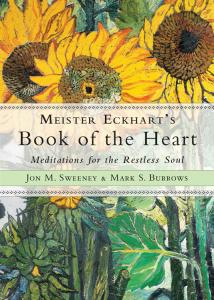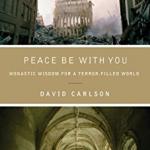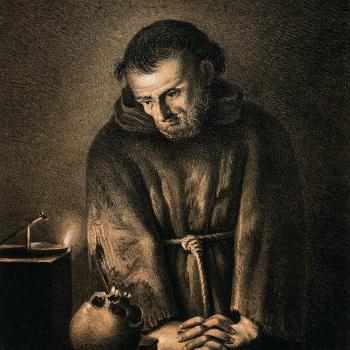
Today’s post is by guest contributor Mark S. Burrows, who is a poet and an authority on the great medieval mystic, Meister Eckhart.
We live our lives, much of the time, within safe boundaries. It feels better to us. And, to be frank, who does not wish to be safe? Those who find themselves facing bodily threat, or illness, know that such matters allow little room for sentimentality. Safe is safe, period; our “fight or flight” reflex, rooted deep in the most ancient part of the brain, testifies to this, whether we will it or not.
What, then, does it mean to open ourselves to what is “beyond” what we can know? Beyond what we can manage or control?
If safety is rooted in one part of our brain, then the will to explore — the desire to discover what is new— also operates, and powerfully, in a different part. Meister Eckhart knew about both of these in his own way, and was wise enough not to play the one off against the other. Perhaps because in his times, life seemed much more uncertain for the masses, closer to the bone perhaps, nearer to death in the midst of things. Safety did not seem to be a right, but rather a gift — as indeed it is, as many in our times also know.
What rings like a leitmotiv through Eckhart’s writings, perhaps for this very reason, is the need to move beyond the familiar. This is true for our image of God, of course. But it is as true for our self-image, and for what we expect from or project on others. In fact, Eckhart goes so far as to imagine that there is no “why” in God. No unsettled questions. No unneeded argument. God simply is, just as we ourselves simply are. Even when our lives are not simple!
Eckhart knew this as love.
Simply this, even when it is not so simple, because we complicate it in our thinking — about God, about ourselves, about others.
Love is. It is we who are becoming.
What would happen, though, if we relinquished our need to understand, and sought rather to rest in love? And, in this rest, sought to love all that we have, and are?
And what if, in learning to love beyond our expectations, we learned to let go, little by little, of the excess we think we need in our lives—and in our relationships with others? What if that letting-go created space in our hearts for love, to be in love, beyond what we can do or manage or expect?

Living in this “beyond” is a persistent theme in Meister Eckhart’s writings.
Living in the “beyond” is the source of our freedom. The heart of our joy. The means of our happiness.
We sought to give it voice with the following words, taken from a sermon inspired by the description of the apostle Paul rising from the ground and “seeing nothing” (Acts 9.8).
No-thing. Only love, the Meister suggests. Only God, in all that is. Only every-thing, in love.
Here, then, is “The One Nameless Truth”:
You, nameless God, want to form
Yourself in me and give yourself
to me, not as I think or want or will
but rather as You are, beyond all
thinking and wanting and willing
in the one nameless truth of Love.
Mark S. Burrows is the author, with Jon M. Sweeney, of a recently released book, Meister Eckhart’s Book of the Heart: Meditations for the Restless Soul, from which the above poem is taken. A scholar of mysticism and a poet, he teaches theology and literature at the Protestant University of Applied Sciences in Bochum, Germany. A volume of his poems is forthcoming in 2018: The Chance of Home.
Enjoy reading this blog?
Click here to become a patron.
Stay in touch! Connect with Carl McColman on Facebook:














